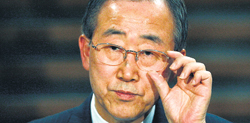
| Put Moon back on orbit, India’s Sen tells G-77 NEW YORK - India, an aspirant for permanent membership in the Security Council and the third largest troop contributor to peacekeeping operations, is not surprisingly a key player in UN diplomacy. The Indians are known not only to jealously safeguard their own national interests — whatever the cost — but also refuse to pull their political punches on controversial UN issues.
So, it was perhaps a mix of the two, that prompted India's Permanent Representative to the UN, Ambassador Nirupam Sen, to warn the new Secretary-General Ban Ki-moon about the limits to his power and authority in running the world body. No Secretary-General has been allowed to knowingly ride roughshod over the interests of member states, defy General Assembly resolutions or reject opinions expressed by administrative and budgetary committees.
As "Dirty Harry" — the fascist San Francisco cop portrayed famously by Clint Eastwood — said before he blew up a punk who pulled a gun on him: "A man should know his limitations." So, should a UN Secretary-General. And last week Ban Ki-moon made the mistake of making two proposals — one to downgrade the UN's Department of Disarmament Affairs (formerly headed by our own Jayantha Dhanapala), and two, to split the Department of Peacekeeping Operations (DPKO) into two. Both proposals have triggered protests not only from developing nations such as India, Brazil, Guatemala, Colombia, Venezuela, Bangladesh, Costa Rica and South Africa, but also from Western nations such as Norway, Austria, New Zealand and Sweden. At a closed-door meeting of the 130-member G-77 developing nations, the largest economic bloc at the UN, Ambassador Sen cautioned the Secretary-General with a heavy-hitting statement: "The Secretary-General is the senior most civil servant in the Secretariat. He is not a king and the Secretariat is not a king's court." "Therefore, we should have no hesitation in expressing views forcefully to him because the idea is not to accept everything he says by acclamation, but to hold him accountable. The question of politeness is also something we need to treat with some caution," said Sen, a former Indian High Commissioner in Colombo. Sen's words reverberated last week through the 39-storeyed "glass house by the East River." "If the proposals on DPKO go through, then it is our soldiers who would face great risks and danger," said Sen, whose home country last year provided 7,340 troops, ranking behind Bangladesh (10,154) and Pakistan (9,516). Sen said the DPKO was set up by the General Assembly back in 1992 after detailed examination of its role, tasks and functions. He said there was "an intensive process" which resulted in drafting the specific functions and mandates of the DPKO. "We cannot jettison them at the drop of a hat without going through relevant procedures, meticulously and stringently," Sen said. Hinting that the Secretariat has no right to dismantle or realign a U.N. Department without proper consultations with member states and budgetary committees, Sen said: "To use a metaphor from a Christian marriage ceremony: those whom the General Assembly resolution has joined together, let no man put asunder." He was dead on target. The secretary-general is expected to meet member states next week to convince them of the efficacy of his two proposals. But he is bound to run into a storm of criticism. Ban Ki-moon was probably naive enough to think he could push through restructuring proposals at short notice — and on deadline. Or he was misled to believe that he would have a smooth run with member states on the restructuring process. On both counts, he was wrong. The question is: how is he going to save face and salvage his proposals against rising opposition or strong reservations?. The G-77 said it does not wish to have public disagreement with the secretary-general. And more importantly, it said, "the Group does not support any artificial deadlines." In a letter to its members, the Group wants the rejection of amendments, if any, to be done in a politically non-hostile environment. But the letter also warned that the meeting should be "an informal closed meeting than a formal plenary of the General Assembly." "This would avoid any embarrassment to the secretary-general in case his proposals require modifications in light of the positions of member states." But the rejections or modifications are coming — and it depends on how much the new Secretary-General can stomach. |
|| Front
Page | News | Editorial | Columns | Sports | Plus | Financial
Times | International | Mirror | TV
Times | Funday
Times || |
| |
Copyright
2007 Wijeya
Newspapers Ltd.Colombo. Sri Lanka. |

